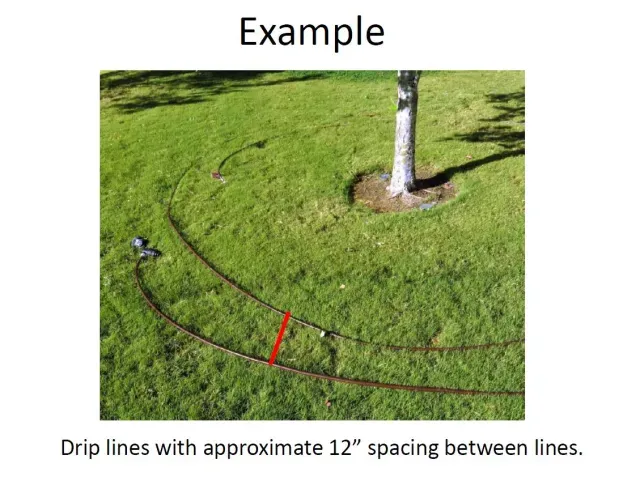Water Trees First

Our trees are the most important garden asset. They provide shade, clean the air, provide habitat for wildlife, they are beautiful and increase your property value.
A new way of irrigating trees have been developed by the University of California. As you see in the picture you will circle the tree with a drip line or soaker hose to the edge of the canopy. You can purchase supplies at your local garden center or hardware store.
To get the deep watering need for trees, you will need to run the drip line for several hours but only irrigate every 2-4 weeks. The water needs to penetrate the soil about 2-3 feed deep.
For more information from the California Center for Urban Horticulture, click here.
Water-wise tips
Create drought resistant soil
- By incorporating 2-4 inches of compost into the soil you will increase the water holding capacity of the soil.
- Topdressing compost around plants will reduce water needs but not up to the plant base. Space @ the base.
- Mulch all exposed soil to reduce evaporation with bark, leaf litter or rocks
Benefit:
- Reduced water usage
Grow California or Mediterranean natives
Check out the UC Arboretum All-Stars
- Plants thrive with little irrigation
- Planting in the fall allows the roots to grow without competition
- Irrigate until established
- Minimize high water use ornamentals
Benefit:
- Reduce watering
- Reduce trimming
- Reduce fertilizing
- Reduce spraying
Minimize the Lawn
- The use of native groundcovers, grasses, shrubs and trees make an eye catching garden
- Reduce the size of the lawn and plant Tall fescue. It is a cool season grass that does well in summer. Most cool season grasses need a lot of water to look good
- Avoid slopes, plant a ground cover instead of lawn
Benefit:
- Conserve water
- Conserve energy
- Conserve labor
Hydrozoning
- By grouping plants together by water and light needs plants tend to be healthy
- When you group your plants together by water and light needs then you can properly water each micro-climate
- Use California natives
Benefit:
- Healthy plants
- Conserve water
- Less pruning
Irrigation System
- Remember to change your irrigation timer seasonally. Monthly adjustments are encouraged
- Use an automatic controller on your irrigation system
- Use drip for your flower and shrub beds
- Replace old sprinkler heads with high efficient ones. If your system is over 10 years old check out the new sprinkler heads at your local garden center
- Use multiple run times if you have a lot of run-off before the timer shuts off. For example; you should irrigate every other day for 20 minutes but after 15 minutes the water is running off the lawn. Instead run the system for 10 minutes, wait 1 hour and run for another 10 minutes. This works especially well on slopes.
Benefit:
- Limit evaporation and run-off
- Limit disease
- Limit weeds
Irrigate according to the season
- Know your watering needs
- Adjust watering to the season, use chart in Lawn Watering brochure
- Water early
- Water slowly
- Water deeply
Benefit:
- Appropriate watering slows plant growth
- Promotes plant health
- Reduces pruning and mowing
- It is estimated that overwatering causes 85% of all landscape problems
Make every Drop Count
- Water wisely and slowly.
- Mulch is one of the quickest, easiest and most cost-effective ways to save water
- Repair leaks and broken sprinklers
- Reduce overspray areas
- Adjust the system frequently to the season
- Mulching exposed soil reduces evaporation.
- Prevent urban drool
Benefit:
- Conserve water
- Save money
- Urban landscape water use can be reduced by 50%
More information:
How to save water in your garden
Keep Plantings Alive under Drought Conditions
Lawn Watering Guide for California
Rules of Thumb for Water Wise Landscape
